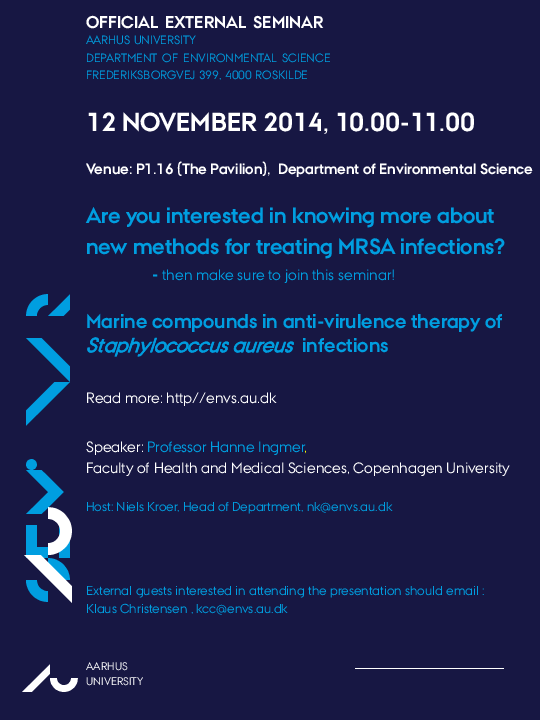Official ENVS seminar with Professor Hanne Ingmer, Faculty of Health and Medical Sciences, KU
Title: Marine compounds in anti-virulence therapy of Staphylococcus aureus infections.
Info about event
Time
Location
The Pavilion, Roskilde

Are you interested in knowing more about new methods for treating MRSA infections?
- then make sure to come to the seminar on Wednesday 12 November 10:00-11:00 in P1.16 (The Pavilion, Roskilde).
Speaker: Professor Hanne Ingmer, Faculty of Health and Medical Sciences, Copenhagen University
Title: Marine compounds in anti-virulence therapy of Staphylococcus aureus infections
Abstract:
Staphylococcus aureus is a human Gram-positive pathogen that is giving rise to serious life threatening infections and is becoming increasingly difficult to treat due to antibiotic resistance. Specifically, the methicillin resistant S. aureus (MRSA) strains such as USA300 are a major concern as they are both highly virulent and transmissible. Contributing to the aggressiveness of these strains is the agr quorum sensing system, which controls expression of major virulence factors. Therefore, new antimicrobial approaches are sought to treat otherwise resistant strains. One such approach is anti-virulence therapy, where virulence factor production rather than viability is target by anti-infective drugs. The agr system is a key target for anti-virulence therapy in S. aureus and recently, we have found that marine microorganisms provide a valuable source of compounds that interfere with the agr system. Most remarkably we have identified a cyclodepsipeptide termed Solonamide B produced and secreted by a Gram-negative marine bacterium, that markedly reduces agr activity. Surprisingly, the structure of Solonamide B resembles the natural S. aureus autoinducing peptides (AIPs), which are the mediators of the quorum sensing capability of agr. Our data suggest that the marine environment should be investigated further for compounds with anti-virulence activity and that agr system of S. aureus may be involved in broader biological sensing between bacterial species
Host: Niels Kroer (nk@envs.au.dk)
External guests interested in attending the presentation should email: Klaus Christensen, kcc@envs.au.dk
